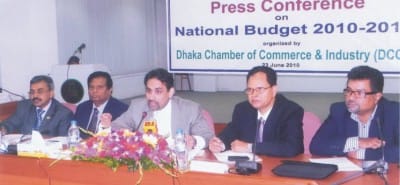DCCI urges govt to reconsider tax proposals

Abul Kasem Khan, president of Dhaka Chamber of Commerce and Industry (DCCI), speaks at a post-budget press conference at DCCI office in the capital yesterday. Md Sirajuddin Malik, second from left, vice president, is also seen. Photo: DCCI
The Dhaka Chamber of Commerce and Industry has said the proposed higher tax at source for the export sector will hamper RMG export growth.
It said the sector will lose global competitiveness if the government proposal of one percent tax at source on exportable goods, which is four times higher than the previous year, is implemented.
The chamber leaders' call came at a post-budget press conference in Dhaka yesterday.
They also urged the government to increase the lowest ceiling for income tax to Tk 2 lakh from the existing Tk 1.65 lakh, as the cost of living has significantly increased on inflation and a price spiral of necessities.
They proposed that the government reduce the corporate tax to 25 percent from the proposed 27.5 percent for listed companies; to 35 percent from 37.5 percent for non-listed companies; and to 40 percent from 42.5 percent for banks.
The value added tax (VAT) is a government revenue collection mechanism, which is ultimately borne by the end user.
The business leaders claimed that the prices of products will rise next fiscal year as the government imposed 20 percent VAT on business operations, which is two times greater than the rate in the outgoing budget.
They also said the government imposed VAT on some items, such as the rent for commercial office space, which is an extension of the VAT concept.
"VAT is levied on each stage of value addition of a product or service. Since VAT on rent of commercial office space has no value addition, businessmen want to know from the government why they have to pay VAT on it," said Rafiqul Islam Khan, a director of DCCI.
In response to a query, a section of DCCI leaders, who are involved in the garments sector, said they would increase the minimum wages for RMG workers as per the government-fixed rate as soon as possible.
"We want to increase the minimum wages for the RMG workers, but they have to wait for the time being as the government has taken initiatives to upgrade the minimum wages," a DCCI leader said.
The leaders also proposed that the government operate the PSI (pre-shipment inspection) through PPP (public private partnership) programmes.
"We urge the government to operate the PSI system under PPP by involving exporters as the customs department of NBR is yet to raise capacity," said Abul Kasem Khan, president of DCCI.
Apart from this, they urged the government to finalise the PPP guideline by enacting a law through parliament, rather than issuing an executive order, as there is a common phenomenon in Bangladesh of changing the policies when a new government assumes power.
The private sector wants protection for their investment. If they do not get protection, they will not invest under PPP, said industry insiders.
The DCCI leaders also urged the government to allocate Tk 10,000 crore for the power and energy sector from the proposed Tk 6,115 in the budget, provide special allocation of TK 5,000 crore to ease traffic congestion in Dhaka, continue privatisation of state-owned enterprises, create a separate ministry for railways and implement the Dhaka-Chittagong Economic Corridor project with special budgetary allocation.

 For all latest news, follow The Daily Star's Google News channel.
For all latest news, follow The Daily Star's Google News channel. 



Comments